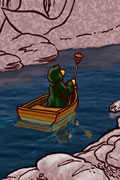 |
||
| home : news : reviews : features : fiction : podcast : blogs : t-shirts : wtf? | ||
|
Epic Pooh
Author's Note: 'Epic Pooh' was originally published as an essay by the BSFA, revised for its inclusion in the 1989 book Wizardry and Wild Romance, A Study of Epic Fantasy, and slightly revised again for this publication. It was written long before the publication and much-deserved success of Philip Pullman's 'His Dark Materials' trilogy which, in my view, merits all the optimism I have expressed here. The essay did not attempt to deal with all fantasy, such as Alice in Wonderland or other children's fantasy, but only epic fantasy from its origins in romance poetry to the present day. Certain highlighted phrases indicate additional comments from the author: mouse over the phrase to read the note. Epic Pooh
I have sometimes wondered how much the advent of steam influenced Victorian ballad poetry and romantic prose. Reading Dunsany, for instance, it often occurs to me that his early stories were all written during train journeys:
The sort of prose most often identified with "high" fantasy is the prose of the nursery-room. It is a lullaby; it is meant to soothe and console. It is mouth-music. It is frequently enjoyed not for its tensions but for its lack of tensions. It coddles; it makes friends with you; it tells you comforting lies. It is soft:
It is the predominant tone of The Lord of the Rings and Watership Down and it is the main reason why these books, like many similar ones in the past, are successful. It is the tone of many forgotten British and American bestsellers, well-remembered children's books, like The Wind in the Willows, you often hear it in regional fiction addressed to a local audience, or, in a more sophisticated form, James Barrie (Dear Brutus, Mary Rose and, of course, Peter Pan). Unlike the tone of E.Nesbit (Five Children and It etc.), Richmal Crompton (the 'William' books) Terry Pratchett or the redoubtable J.K.Rowling, it is sentimental, slightly distanced, often wistful, a trifle retrospective; it contains little wit and much whimsy. The humour is often unconscious because, as with Tolkien, the authors take words seriously but without pleasure:
I have been told it is not fair to quote from the earlier parts of The Lord of the Rings, that I should look elsewhere to find much better stuff so, opening it entirely at random, I find some improvement in substance and writing, but that tone is still there:
Tolkien does, admittedly, rise above this sort of thing on occasions, in some
key scenes, but often such a scene will be ruined by ghastly verse and it is
remarkable how frequently he will draw back from the implications of the subject
matter. Like Chesterton, and other orthodox Christian writers who substituted
faith for artistic rigour he sees the petit bourgeoisie, the honest artisans
and peasants, as the bulwark against Chaos. These people are always sentimentalized
in such fiction because traditionally, they are always the last to complain
about any deficiencies in the social status quo. They are a type familiar to
anyone who ever watched an English film of the thirties and forties, particularly
a war-film, where they represented solid good sense opposed to a perverted intellectualism.
In many ways The Lord of the Rings is, if not exactly anti-romantic,
an anti-romance. Tolkien, and his fellow "Inklings" (the dons who
met in Lewis's Oxford rooms to read their work in progress to one another),
had extraordinarily ambiguous attitudes towards Romance (and just about everything
else), which is doubtless why his trilogy has so many confused moments when
the tension flags completely. But he could, at his best, produce prose much
better than that of his Oxford contemporaries who perhaps lacked his respect
for middle-English poetry. He claimed that his work was primarily linguistic
in its original conception, that there were no symbols or allegories to be found
in it, but his beliefs permeate the book as thoroughly as
they do the books of Charles Williams and C. S. Lewis, who, consciously or unconsciously,
promoted their orthodox Toryism in everything they wrote. While there is an
argument for the reactionary nature of the books, they are certainly deeply
conservative and strongly anti-urban, which is what leads some to associate
them with a kind of Wagnerish hitlerism. I don't think these books are 'fascist',
but they certainly don't exactly argue with the 18th century enlightened Toryism
with which the English comfort themselves so frequently in these upsetting times.
They don't ask any questions of white men in grey clothing who somehow have
a handle on what's best for us.
|
|
||||||||||||||||
RevolutionSF is ™ and © Revolution Web Development, Inc., except as noted.
Intended for readers age 18 and above.




